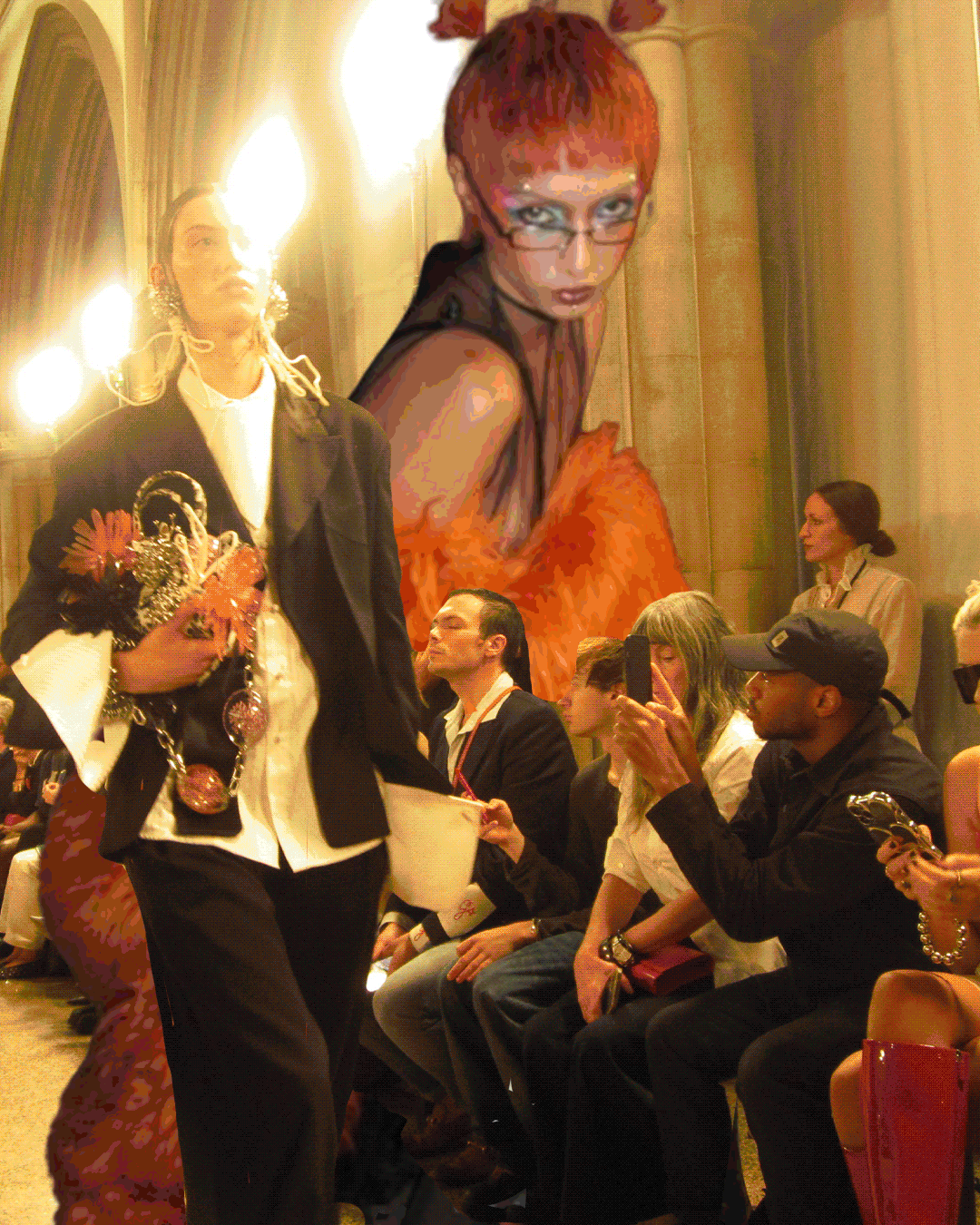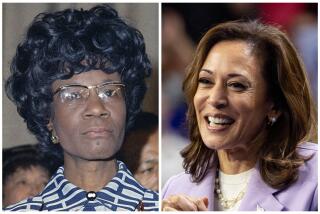Black Women Unite at Forum ’85 : Americans, Africans Work Together on Panels, Petitions
- Share via
NAIROBI, Kenya — American black women have come in extraordinary numbers to Forum ‘85, the non-governmental world meeting for women being held here. And so have black women from all over Africa. They are running or participating in countless panels and workshops, holding informal meetings, some closed sessions, circulating petitions, networking, enlisting support. The African and American black women, including women from the Caribbean area, are doing much of it together.
The image of the African woman as wood gatherer, water bearer, farmer and oppressed wife is a true one, and characterizes the overwhelming majority of women in every country. However, it is not the only valid image.
Africans’ Impact
The Africans who have come to Forum ’85 are making a strong impression. They are standing out in a gathering of strong women, as other forum participants are increasingly remarking almost with awe at times. They are revealing themselves to be strong leaders, aggressive businesswomen, shrewd negotiators, sophisticated politicians, and no-nonsense feminists who see no contradiction in talking about Third World economic problems and political ideologies one moment, and wife beating, female illiteracy and overwork the next.
On Tuesday, African women came together with American black women under the auspices of a group that had arrived in Nairobi already well aware of their abilities and problems.
The National Council of Negro Women, a 45-year-old American organization, held an all-day seminar at the Norfolk Hotel, across the street from the University of Nairobi where most of the forum is taking place. The subject: a dialogue between African and American women on developments during the decade.
The council’s international division has been working with African women since 1975, “twinning” with women’s organizations in African countries on development projects.
They started in 1975 to mark the 100th anniversary of the birth of their founder, Mary McLeod Bethune, according to Dorothy Height, 73, NCNW president and convener of the seminar.
“We felt that during her centenary we needed to do something to move our work to another dimension. She always stressed that we be interracial and international. Since 1975 was the international women’s year, we decided to take what we had been doing and relate directly to the year by working internationally.”
The seminar, Height told the group, was intended to take a look at “what’s been happening over the past 10 years, what changes have taken place socially, economically, politically . . . to see what’s happened that advances women to a better life and what is left undone.”
Equally important, she told the women, they would be hearing from South African women since “we are very concerned about apartheid and its impact on women and children” and wanted to discuss what they could do about it.
Maureen Reagan Speaks Out
(Meanwhile, at the simultaneous official U.N. conference here marking the end of the Decade for Women, Maureen Reagan denounced apartheid.
(“Apartheid is abhorrent to the government and the people of the United States,” Reagan said in her 15-minute speech.
(“In addition to its demeaning and destructive effect on the black people of South Africa, its effects upon women are especially severe.”
(Reagan, head of the U.S. delegation, received loud applause when she called for a “conference of women, by women and for women” and also when she pledged she would not deny any woman from using the conference as a platform for political opinion.)
The group of about 100 attending the workshop dealing with black women’s issues tended to be more middle- to late middle-aged than young. Among the Americans, there were Lois Carson of San Bernardino, Pat Canterbury of Sacramento, an executive in the secretary of state’s office, Glendora Putnam, national president of the YWCA, and several elected officials, including Erma Henderson, president of the Detroit City Council, and Carolyn Kirkpatrick of the Michigan State Legislature. At one point in the afternoon, Betty Shabazz, widow of slain black leader Malcolm X and a faculty member at Medgar Evers University in Brooklyn, came in and joined the discussion.
They were for the most part conservative-looking, solid types short on rhetoric and ideology, long on practical experience and hard, persistent work.
Their comments, from the panel and from the floor, are a good indicator, not only of the interest African and American black women are taking in each other, but of what the U.N. Decade for Women has been about. Here is what some of them had to say:
“A lot has happened in Senegal in the past 10 years. There have been new developments, especially with my organization, the Federation of Women’s Organizations. There are 84 associations in the federation. The government makes grants available to us. In government there are now three women ministers and in parliament there are 15 deputies out of 125. Professions that forbade women before are now open--diplomacy, police, the military, the polytechnical school. Women are on the rural community councils and there is one woman mayor of a municipality. We now get full pay for maternity leave. Each year from March 15-30 we have a seminar to discuss our problems.”
(Hadja Fadiop Sall, Senegal, had delivered her remarks in French with the aid of a translator.)
“It’s a little different in Botswana. The decade happened midway for us. From 1976-80 we did not have a coordinating ministry for women’s affairs. One was established after the Copenhagen mid-decade conference. I think we’re not badly off. We’re trying to catch up. I was the first coordinator of that ministry of women’s affairs, but I opted out. As a civil servant I couldn’t say what I wanted to say. I was more tied down to government policies. I’m still a civil servant now (in another job), but I’m here in Nairobi as a woman representing women’s organizations.” (Nzipho Sekoma, Botswana, who was applauded with approving “all rights!” from her American sisters.)
“Until 1984 there was only one party and one women’s organization controlled by the government. Now we are free to organize as we like, but we are very new. Women play two roles in our country. They are producers and they raise the family. They have to be integrated into the decision-making and planning processes. Eighty percent are involved in agriculture. They cultivate, sow, carry water, gather wood, grind flour, press oil, make butter and cheese, prepare meals, dry the cereals, tend the animals--that takes us a lot of time.” (Aisha Boh, Guinea)
“There is this notion among Third World women of triple jeopardy. We are victimized by sex, race, class. It’s the same in the U.S.--it’s only a matter of degree. We’re undereducated, politically alienated . . . We in the United States are still ruled by men. There is a male ethos pervading the world. It’s a common problem.” (Yvonne Ewell, U.S.A.)
“Girls tend to be educated for our so-called ‘flourishing tourist industry’ rather than the professions. We have to compete with incompetent men. Our women are more ambitious than men, there are more of them in the evening courses. Yet we do not see them in the top positions. Women are teachers, nurses or domestics in the hotels. In 1975, the minister of health, a woman, helped abolish the law saying we could only open bank accounts or businesses with our husbands’ permission. We have boutiques and stores now.” (Linda Richardson Badejo, St. Martin’s Antilles)
“We are paying taxes to oppress ourselves and to support a military that is killing our kids every day. . . .
“Perhaps I should tell you that the word ‘homeland’ to us has no warm meaning. The homelands established by the South African government are tribal death cells. They are filled with hungry women and children with no health facilities. The land is not fertile. If you drive through in the winter you want to cry out and scream. That is Africa’s son and daughter, walking cold and barefoot and hungry three kilometers along the road to school.” (Joyce Siwani, South Africa)
The day ended with the women considering practical steps they could take about apartheid and, at Hadja Fadiop Sall’s urging, what they could do to help alleviate the problems caused by the drought in the Sahel.
The South Africans suggested that NCNW join them on Aug. 9, which is South African women’s day commemorating a mass demonstration of women against the pass laws.
They urged the Americans to withdraw their money from banks that do business with South Africa, and ask their city councils and state governments to free their pension plans of investments in South Africa. They also asked them to work on tuition waivers for South African students.
Betty Shabazz expressed some concern about some black Americans who get themselves arrested (in anti-apartheid acts) with the knowledge the whole process will be over in half an hour and they will be released. Her concern was with those who then make minor celebrities of themselves as having been “arrested for South Africa.” It disturbed her to have such arrests in any way equated with the arrests and imprisonments that South Africans were enduring.
The South Africans were diplomatic, but indicated they did like to be consulted about what was best. There were many of them in the United States, but they frequently encountered people who thought “they can articulate our situation better than we can.”
Height thanked the South African women who had come to them at “great risk. They know what it is like at home and can tell us about it. What they don’t know is what it’s going to be like when they go back.”
More to Read
Sign up for Essential California
The most important California stories and recommendations in your inbox every morning.
You may occasionally receive promotional content from the Los Angeles Times.










